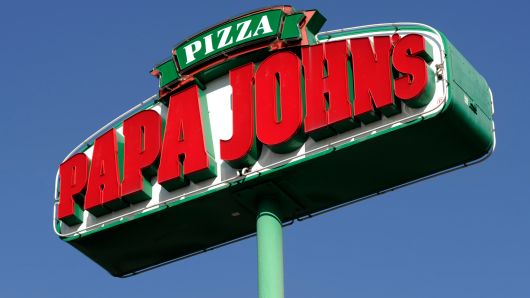
Papa John’s has hired Bank of America and Lazard as financial advisors to counsel the beleaguered pizza chain as it tries to stem damage following last month’s very messy and public ouster of its founder, people familiar with the matter told CNBC on Friday.
The company’s shares have fallen by almost 45 percent over the last year as it grappled with weak sales and a public relations crisis after racially charged comments made last fall by founder and former Chairman and CEO John Schnatter that drew public outrage.
The company isn’t currently exploring a sale, said one of the people who was briefed on the board’s thinking. They requested anonymity because the information is confidential.
“While we recognize Papa John’s attraction as an acquisition candidate given its current turmoil and turnaround potential, we believe the likelihood for some type of strategic action is low without founder John Schnatter’s approval,” Peter Saleh, analyst at BTIG, wrote in a research note Friday. Saleh said he doesn’t think Schnatter, who has a roughly 30 percent stake in the company, has any interest in selling or stepping away, “making the math on shareholder approval of such an action more difficult, though not impossible.”
Papa John’s, Bank of America, investment bank Lazard and representatives for Schnatter declined to comment.
The company’s shares have been under pressure since November, when Schnatter blamed the company’s slowing pizza sales on the National Football League’s lack of leadership over player protests during the national anthem. Shares were hit again in July when Schnatter admitted to using a racially charged slur on a media training conference call in May.
Reuters reported earlier that Papa John’s hired Bank of America and Lazard.
Schnatter has been locked in a bitter feud with the company since he was asked to step down in July, accusing the board of mismanagement and staging a coup against him. Sales had been falling for months, but the decline has accelerated in recent weeks.
To help offset the drop in sales for franchise owners, Papa John’s announced earlier this month that it would reduce royalty payments, fees and dough prices, among other expenses.
Since hitting an all-time high of $90.49 per share in December 2016, Papa John’s stock has lost more than half its value.
Sales growth at stores open for at least a year peaked during the third quarter of 2016. But that growth started to slip by the fourth quarter of that year and has progressively gotten worse. By the fourth quarter of 2017, same-store sales growth turned negative and have continued to slide.

